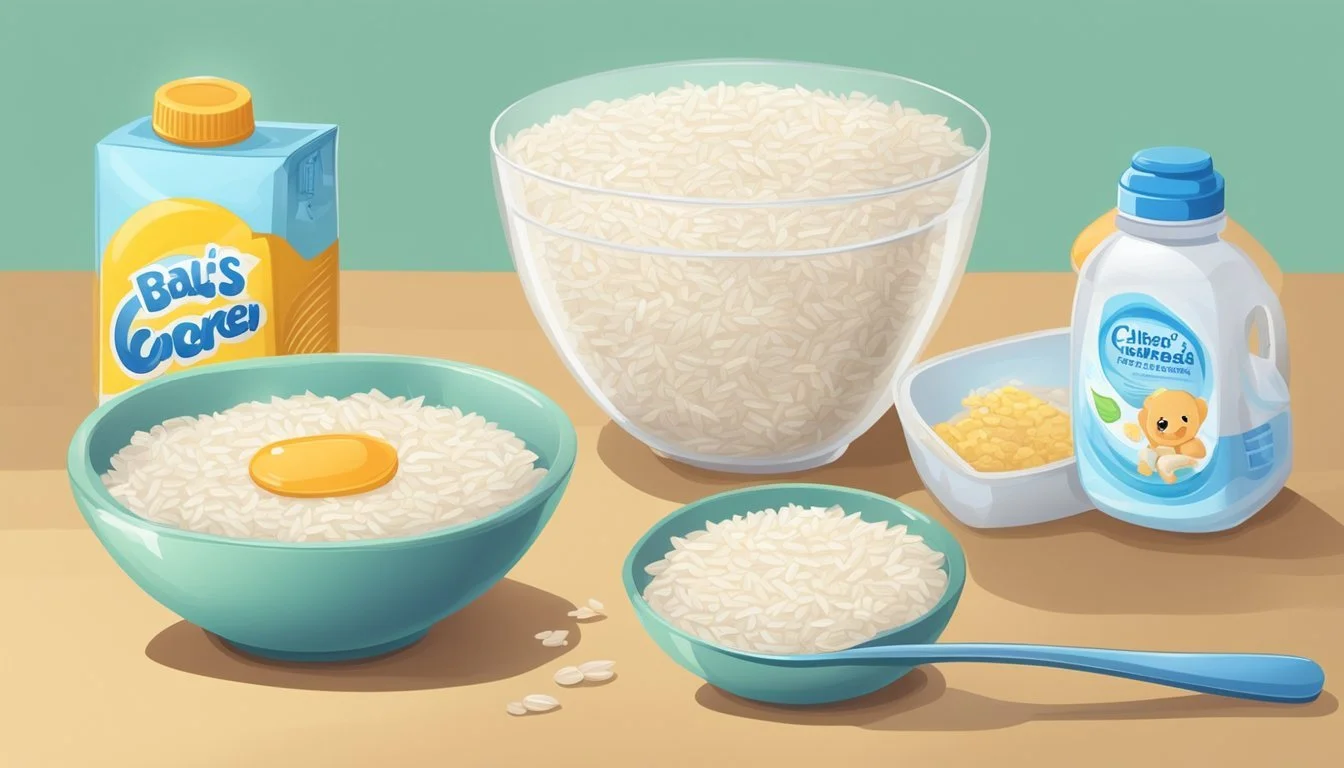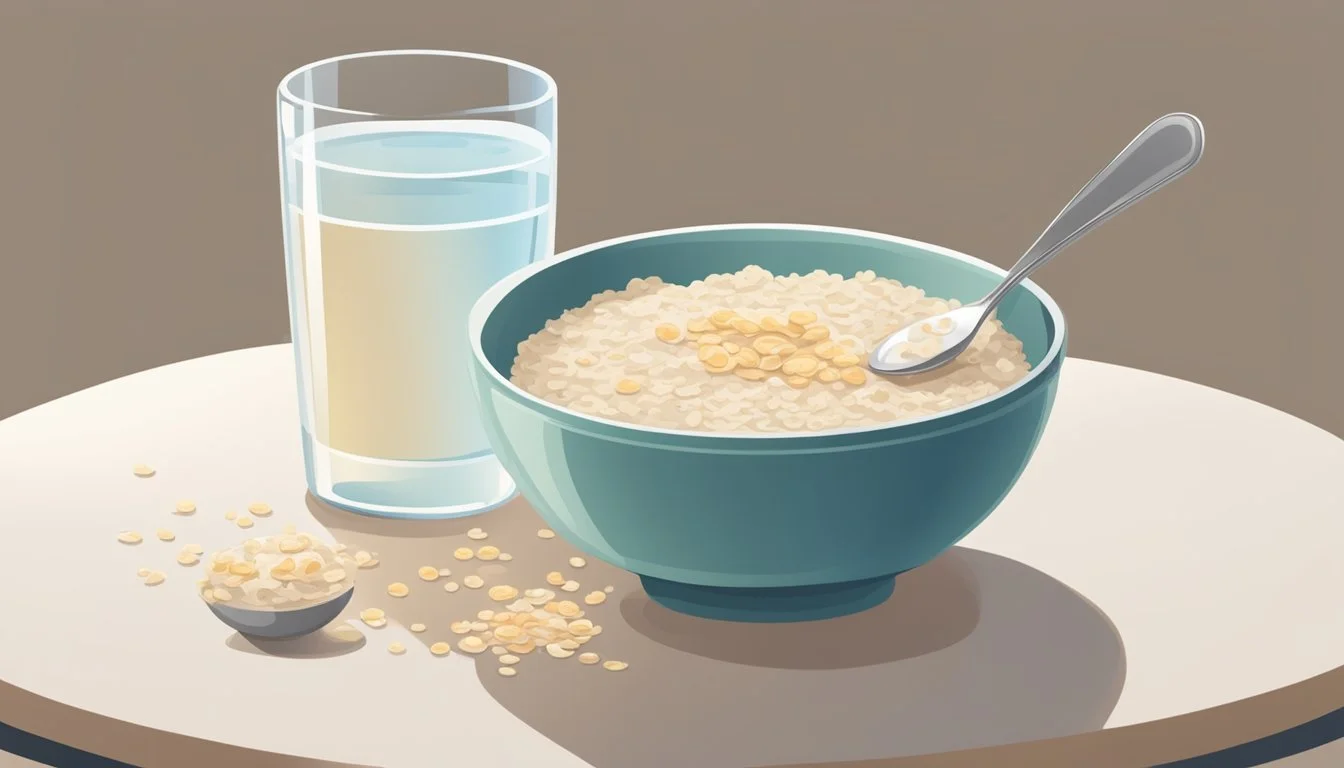Gentle Foods to Ease Baby Diarrhea and Promote Recovery
Understanding the proper foods to offer a baby experiencing diarrhea is crucial for their recovery and well-being. Babies can suffer from diarrhea for various reasons, including infections, dietary changes, or sensitivities. Offering the right types of food can help ease symptoms and promote quicker healing.
Hydration and nutrition are key components in managing baby diarrhea effectively. A balanced approach to feeding, while ensuring proper fluid intake, can alleviate discomfort and prevent further complications. This article will explore different food options that can aid in managing and reducing the symptoms of baby diarrhea.
1) Bananas
Bananas are a beneficial food for babies experiencing diarrhea. They contain pectin, a type of soluble fiber that can help absorb excess water in the intestines, which can lead to firmer stools.
Rich in potassium, bananas also help replace electrolytes lost during bouts of diarrhea. This electrolyte is crucial in maintaining fluid balance and proper muscle function.
Bananas are easily digestible, making them gentle on a baby's stomach. Their mild flavor and soft texture are generally well-tolerated by infants, making them a practical choice for reintroducing solid foods.
Offering mashed or pureed bananas can provide both nutritional benefits and ease of consumption for young children. Always ensure bananas are ripe, as unripe bananas might be harder to digest for some babies.
2) Rice Cereal
Rice cereal is often considered a suitable first food for babies. It is made from finely ground rice, making it easy to digest. Additionally, rice cereal is usually fortified with essential nutrients like iron, zinc, and vitamins which are important for a baby's development.
It is bland, which can be ideal for an upset stomach. The binding nature of rice can help firm up stools, potentially reducing the severity of diarrhea. This makes it a popular choice among parents looking to ease their baby's digestive issues.
When introducing rice cereal to a baby with diarrhea, it is important to prepare it properly. Mixing the cereal with water, breast milk, or formula can create a smooth consistency that is gentle on the stomach. It's best to avoid adding any sweeteners or flavorings to keep it simple and effective.
Feeding rice cereal in small, frequent portions can be beneficial. Taking it slowly allows the baby's digestive system to adjust, preventing further irritation. This gradual approach can be key in managing symptoms effectively.
Parents should ensure that the rice cereal is part of a balanced diet. Even while using it to address diarrhea, they should monitor the baby's response and consult with a healthcare professional if needed. This ensures that the baby receives appropriate care and nutrition.
3) Applesauce
Applesauce can be an effective food choice for babies suffering from diarrhea. It is a binding food, meaning it can help firm up a baby's stools. This quality makes applesauce suitable for managing diarrhea.
The pectin in applesauce aids in absorbing excess water in the intestines, which helps reduce the frequency of loose stools. This makes applesauce an easy-to-digest option for young children.
For babies with constipation, applesauce can also induce bowel movements due to the fiber content. It is important to choose unsweetened and smooth applesauce to avoid added sugars or chunks that may not be suitable for babies.
Applesauce is also nutrient-dense and generally safe for babies who are at least four months old, as long as they can sit up without assistance and have their pediatrician's approval for solid foods. The simplicity and accessibility of applesauce make it a convenient option for parents and caregivers.
4) Carrots
Carrots can be a helpful food option for babies experiencing diarrhea. They are rich in nutrients and contain soluble fiber, which can aid in firming stools. Cooking the carrots makes them easier to digest and can also provide a soothing effect on the baby's stomach.
To prepare a carrot remedy, carrots can be boiled and then mashed into a smooth puree. This simple preparation ensures that the baby can easily consume the carrots without any difficulties. Boiled or steamed carrots are gentle on the digestive system and can help in managing diarrhea symptoms.
Carrot soup is another effective way to incorporate this vegetable into the baby's diet. Cooking carrots in broth with a small amount of seasoning ensures that the baby receives the nutritional benefits in a palatable form. This warm soup can help keep the baby hydrated and provide essential nutrients.
Always ensure the carrots are cooked until they are soft and can be easily mashed or blended. This reduces the risk of choking and makes it easier for the baby to digest. Freshly cooked, unseasoned carrots are recommended to avoid any potential irritants.
Incorporating carrots into the diet when the baby has diarrhea can be a simple and effective home remedy to help manage the symptoms and promote recovery. Always consult with a pediatrician if the symptoms persist or if there are additional concerns.
5) Plain Yogurt
Plain yogurt, specifically whole milk yogurt, can be beneficial for babies experiencing diarrhea. The beneficial bacteria, or probiotics, found in plain yogurt aid in digestion.
These probiotics help restore the natural balance of bacteria in the gut.
It's important to choose yogurt that is plain and free from added sugars or artificial sweeteners. These additives can exacerbate digestive issues.
Whole milk yogurt also provides essential nutrients like calcium, protein, and fat, which are important for a baby’s growth and development. The live active cultures in yogurt, such as lactobacillus, can support gut health and may help reduce the duration of diarrhea.
Incorporating plain yogurt into a baby's diet during a bout of diarrhea can be a gentle way to support their digestion and provide necessary nutrients.
6) Boiled Potatoes
Boiled potatoes can be a gentle and effective food for helping manage a baby’s diarrhea. The soft texture is easy for small stomachs to digest and less likely to irritate the sensitive intestinal lining.
The starch content in potatoes can help add bulk to stools, making them firmer. This can be particularly useful when trying to manage loose stools and provide some relief for the baby.
It's recommended to serve boiled potatoes plain, without any added spices or seasonings, to avoid potential irritation. They can be mashed or cut into small pieces to make them easier for the baby to consume.
Boiled potatoes also contain essential nutrients such as potassium, which can be beneficial during episodes of diarrhea. Potassium can help replenish electrolytes that may be lost.
Parents should avoid adding butter or oil to the potatoes, focusing on simplicity to make sure the food is gentle on the baby’s digestive system.
Providing small, frequent servings can make it easier for the baby to digest the food and derive the most benefit without overwhelming their stomach.
7) Butternut squash
Butternut squash is a great option for babies experiencing diarrhea. Rich in fiber and essential vitamins like A, C, and E, it helps in restoring nutrient balance.
When preparing butternut squash for babies, it's best to steam or roast the squash. Steaming retains most of the nutrients and makes it easy to digest.
For steaming, peel the squash, cut it into small pieces, and place in a steamer basket over boiling water. Cover with a lid and steam until the pieces are tender.
Roasting involves cutting the squash in half, removing seeds, and placing it face-up on a baking tray. Roast at 375°F for about 50 minutes until tender.
Once cooked, mash the squash or puree it for younger babies. Older babies may enjoy small, soft pieces as finger food. Avoid adding any spices or butter; keep it plain to avoid upsetting their stomach.
Always ensure the squash is fully cooked and soft to avoid any choking hazards. It's a nutritious choice that can help manage diarrhea and keep your baby well-nourished.
8) Oatmeal
Oatmeal can be a helpful food for managing a baby's diarrhea. It contains soluble fiber that absorbs excess water in the intestines, helping to firm up stools. This makes oatmeal a suitable option when reintroducing solid foods.
When preparing oatmeal for a baby with diarrhea, ensure it is cooked until soft. Avoid adding sugar or any other sweeteners. Simple and plain oatmeal is best.
Oats are also a gentle food, easy on a baby's digestive system. This can provide some relief and nourishment without causing further irritation.
It is important to serve oatmeal in moderation. Start with small portions and observe how the baby responds. This helps in determining if oatmeal is beneficial for their condition.
9) Avocado
Avocado can be beneficial for babies experiencing diarrhea. It is rich in potassium, a vital electrolyte often depleted during diarrhea. By replenishing potassium levels, avocado can help mitigate some diarrhea symptoms.
Avocados are gentle on the digestive system and provide essential nutrients without being irritating. They are packed with vitamins, minerals, and healthy fats that support overall health.
Beyond their nutritional benefits, avocados can be easily incorporated into a baby's diet. They can be mashed and served plain, added to other foods like toast or pasta, or even mixed into baby-friendly dips.
It's important to ensure that avocados are ripe and properly mashed to avoid any choking hazards. Parents should always introduce new foods gradually and watch for any adverse reactions.
10) Sweet Potatoes
Sweet potatoes are a nutritious option for babies experiencing diarrhea. This root vegetable is rich in dietary fiber, which helps promote healthy digestion and can regulate bowel movements.
Fibre content in sweet potatoes can provide bulk to stools, making them easier to pass. Additionally, they are packed with essential vitamins and minerals, such as vitamin A, vitamin C, and potassium, which support overall health.
While sweet potatoes offer many benefits, it is important to monitor how the baby responds to them. In some cases, infants can develop food protein-induced enterocolitis syndrome (FPIES), a gastrointestinal hypersensitivity that could cause diarrhea.
When introducing sweet potatoes to a baby's diet, it is advisable to start with small amounts. Cooking them thoroughly ensures they are easier to digest. Mash or puree for younger infants to make consumption safe and straightforward.
Sweet potatoes can be served alone or mixed with other mild foods. They can be a versatile element in the baby's diet and help manage diarrhea effectively.
Understanding Baby Diarrhea
Baby diarrhea can be alarming but is often manageable with the right knowledge. Knowing the causes and symptoms helps caregivers take appropriate action when needed.
Common Causes
Several factors can contribute to baby diarrhea. Infections from viruses, bacteria, or parasites are frequent culprits. Viral infections like rotavirus and norovirus spread easily among infants.
Bacterial infections such as E.coli and Salmonella often result from contact with contaminated food or water.
Dietary changes can also trigger diarrhea in babies. Introducing new foods may upset their digestive system temporarily. Food intolerances like lactose intolerance cause loose stools when babies consume dairy products.
Medications, especially antibiotics, may disrupt the natural balance of bacteria in the gut and lead to diarrhea.
Teething is sometimes associated with diarrhea, though this link is debated among experts.
Symptoms to Watch For
Recognizing the signs of diarrhea in babies is crucial. Frequent, watery stools are the most apparent symptom. If a baby passes three or more loose stools in a day, it's often considered diarrhea.
Additional symptoms include mucus or blood in the stool, which indicates a more severe condition needing medical attention.
Babies with diarrhea may also show poor appetite, which can lead to weight loss if persistent. Caregivers should be alert to signs of dehydration, such as dry mouth, crying without tears, or reduced urination.
A fever accompanying diarrhea can signal an infection, necessitating a doctor's visit. Keeping an eye on these symptoms helps in managing the condition effectively.
Dietary Considerations for Babies with Diarrhea
When a baby has diarrhea, it's crucial to maintain proper hydration and choose the right foods that can help manage symptoms. Avoiding certain foods can also prevent further irritation and prolongation of the condition.
Hydration Tips
Ensuring that a baby remains hydrated is essential. Breast milk or formula should be offered frequently. For mild to moderate diarrhea, offer fluids every 30-60 minutes.
Electrolyte solutions designed for infants can help replenish lost fluids and minerals. Pediatricians might recommend products like Pedialyte. Avoid juices and sodas as they can worsen diarrhea.
Encourage small, frequent sips rather than large amounts at once. In some cases, continued breastfeeding or formula feeding is sufficient, but if the baby shows signs of dehydration, medical attention is necessary.
Foods to Avoid
Certain foods can exacerbate diarrhea symptoms. Avoid high-sugar foods such as candy and sweets as they can pull water into the intestines, making diarrhea worse. High-fat foods like french fries or greasy snacks should also be avoided as they can be hard to digest.
Dairy products are another group to watch out for, except for breast milk and possibly yogurt containing live cultures. They can contribute to digestive upset in some babies. Juice should be excluded from their diet as the high sugar content can exacerbate diarrhea.
Stick to bland, easy-to-digest foods until diarrhea subsides, ensuring the baby's diet supports recovery.
When to Seek Medical Attention
It's essential to know when baby diarrhea requires professional care. While mild cases often resolve independently, certain symptoms indicate the need for medical intervention.
If an infant experiences diarrhea that doesn't improve after 24 hours, it's crucial to consult a healthcare provider.
Seek immediate medical attention if the baby:
Displays lethargy or severe weakness
Becomes unresponsive or overly irritable
Has a fever exceeding 102°F (38.9°C)
Additional warning signs include:
No wet diaper for three or more hours
Bloody or black stools
Dry mouth or tongue
Crying without tears
Sunken eyes, cheeks, or abdomen
Chronic or severe diarrhea, characterized by more than 10 watery stools a day, also necessitates contacting a doctor.
Table: Key Symptoms for Medical Attention
Symptom Action Diarrhea not improving after 24 hrs Consult healthcare provider Fever above 102°F (38.9°C) Contact health provider No wet diaper for 3+ hours Seek medical attention Lethargy or weakness Get emergency care Bloody or black stools Contact healthcare provider Dry mouth or lack of tears when crying Seek medical attention More than 10 watery stools per day Consult healthcare provider
Caregivers should not hesitate to take action if they notice these symptoms, ensuring prompt and appropriate care for their child.







